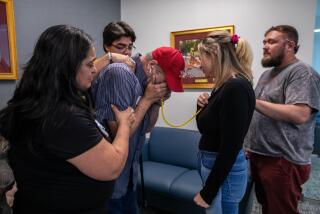Infant’s Death Spotlights Flaws in Organ Programs
- Share via
Nine-month-old Alex Girard died the day before Mother’s Day in Massachusetts from a rare strain of hepatitis. His ravaged liver began to fail, and when a donor organ was finally found in Texas, it reached Alex too late.
Frustrated by what they saw as inertia in the New England Organ Bank--a nonprofit agency that facilitates the procurement of organs for transplant--Alex’s parents had gone public. Paul Girard contacted local newspapers and television stations and asked celebrities for help in obtaining a liver for his dying son.
Among those he reached were the First Family. The White House responded quickly with an offer to transport an infant-sized liver should one be found. Nancy Reagan even telephoned the Girards to express her sympathy.
The Girards’ tragedy briefly touched the hearts of many Americans. It is not difficult to communicate the anguish of one family caught in a cruel turn of fate. It is, apparently, a lot more difficult to communicate the sufferings of literally thousands of parents in the United States who must watch their potentially healthy children die from low birth weight or succumb to permanent mental and physical disability from malnutrition.
The Administration has not sent Air Force One, or its economic and social equivalent, to the one out of four American youngsters who, according to statistics gathered by the Children’s Defense Fund in Washington, are living below the poverty level. Air Force One, or a similar jet plane, costs about $15,000 an hour to run, or about $45,000 to fly from Texas to Massachusetts. Had it been used to transport the donor organ to Alex Girard, it would have been a tax-supported expense few of us would have begrudged.
As it turned out, the donor liver was transported by the private agency, so no public funds were used. But the continued privatization of the organ donor program may not be in the best interests of sick children. The bereaved Girards have spoken out angrily about the lack of an aggressive organ donor plan that might have saved Alex. For although about 25,000 people die each year who could donate their organs, only 2,000 actually do so. The procedures are now handled by two private national networks: the North American Transplant Coordination Organization and the United Network for Organ Sharing. The $31 million voted by Congress in 1984 to establish a national computer bank to match donors with patients has yet to be spent.
Most Americans, I suspect, would not object to implementing the plan. Nor would they begrudge the money that has been eliminated from programs providing prenatal care, education and nutrition to poor mothers. In the last two years, the mortality rate among infants in our nation’s capital has risen to 21 per thousand live births in contrast to the rate of 6 per thousand in Japan and Finland.
More to Read
Sign up for Essential California
The most important California stories and recommendations in your inbox every morning.
You may occasionally receive promotional content from the Los Angeles Times.










